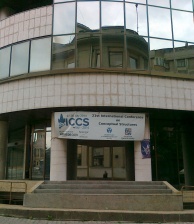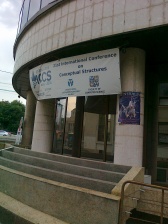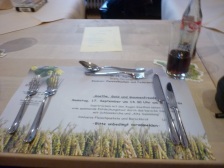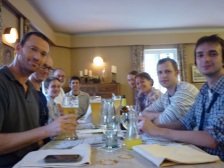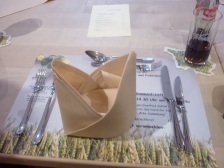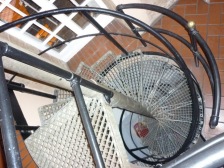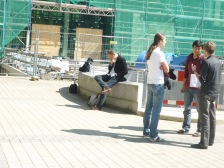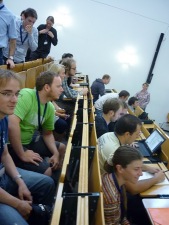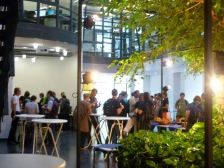Concept of multiplicity
July 3, 2019 — MihaelaComplementarity
November 28, 2014 — Mihaela‘Nullius in verba: don’t take anyone’s word for it. Examine it; observe it; record it; experiment. Modern science tells us that what we perceive is untrue. It frequently contradicts common sense. It is obvious that a heavy object will fall to the earth faster than a lighter one, so obvious that Aristotle stated the fact and its factuality was accepted for two thousand years. Galileo showed ‘the fact’ to be untrue by experiment and measured observation, science’s techniques of disenchantment. We do not sit on a stationary earth at the centre of the universe. This appears to be the case to our unexperimental senses, certainly. But science has established that we inhabit a tiny space inside an unimaginably vast one; that we spin around, although we do not appear to be doing so to ourselves; that the sun does not rise above our settled selves and then set later in the day, while our point of observation remains unmoving. The old perceptions that this is precisely what does happen continue their afterlives in our use of the words ‘sunrise’ and ‘sunset’.’
being articulate
September 22, 2011 — MihaelaHistorically, however, the record of philosophers as ‘public intellectuals’ has not been a happy one, as a quick survey of the history of philosophy might show, from the days of Plato and Aristotle in antiquity to at least some of the public interventions of the likes of Heidegger, Sartre and Russell nearer to our own time. For whatever reason, historically there seems to have been no clear correlation between philosophic wisdom and practical wisdom, nor does philosophy in itself afford any reliable credentials for entry into public debate. Philosophers, being articulate and argumentative by training, and often having time on their hands as well, will often involve themselves in public affairs. Indeed, despite denials of the fact from some quarters, philosophers as a group punch well above their weight in getting themselves heard in the public square. The results, though, are mixed, as we have seen, and, for all the good that some do, continue to see. Perhaps part of the reason for this is that philosophy as a subject has no party line, so to speak: philosophers speaking ex cathedra will support Read the rest of this entry »
Reading Class
September 1, 2011 — MihaelaMost people successfully avoided reading until about 300 years ago. It was about then that Western European priests and princes decided that everyone should be taught to read. These literacy-loving types tried various schemes to make common folks literate; the most effective of these, however, was naked coercion. By the nineteenth century, churches and states all over Europe and North America were forcing parents to send their kids to school to learn to read (inter alia). If said parents refused to do so, then they might well get in deep trouble. So it happened that by the early twentieth century most people in Western Europe and North America could read. They had no choice in the matter. They still don’t. Why don’t most people like to read? The answer is surprisingly simple: humans weren’t evolved to read. Note that we have no reading organs: our eyes and brains were made for watching, not for decoding Read the rest of this entry »
Campionát
June 10, 2011 — MihaelaI was so upset that evening that my favorite team, Petrolul Ploiesti, fell back in the B division, that I threw my tshirt out of the window. To be completely honest, I still kept the ball in bed with me, just in case I felt like a kick, when, suddenly, a mouse appeared on my chest with the clear intention of breastfeeding itself on my footballer breast.
-What are you doing, you madman? I said
-I am not a madman, I am a madwoman, and you are my mother it said and burst into tears.
I jumped out of bed, woke up my neighbours shouting and screaming and said:
-Where is your cat, the one we all call Stupid, I urgently need him to eat a mouse.
-On the heater they said. Get him and let us sleep.
I took Stupid under my arm, while still snorring, took him in my flat and threw him Read the rest of this entry »
Scripts
March 1, 2011 — Mihaela“The King’s Speech” is actually aristocratic history; the hero is made better or more noble than he really was through highlighting his singular greatness or admirable individuality. It’s true he’s no ordinary aristocratic hero insofar as he has to struggle so hard to be a king in almost the most minimalist conceivable sense. He doesn’t rule his people, but only reads speeches written by others to bolster their morale. In doing so, however, he performed a perhaps indispensable if minor role in wining a war that saved not only his country but perhaps civilization itself. There’s more than a trace of magnanimity in this rather unexeptional (certainly not brilliant) family guy with un-heroic self-esteem issues. Getting an audience to appreciate nobility requires highlighting it, especially in this case. In this case, members of the audience have to come to appreciate the heroic dimension of the king’s struggle to do what almost every one of them could have done fairly effortlessly and probably better. It’s hard to see why the film’s portrayal of the Facebook founder can be called ambiguous. It’s not surprising that in real life he’s better with “relationships” than he is in the movie. Who isn’t? Probably almost everyone in the audience is.
impact of information
February 23, 2011 — MihaelaFor a hundred years after the electric telegraph, other communication systems such as the telephone, radio, and television were invented and developed by engineers without any need for higher mathematics. Then Shannon supplied the theory to understand all of these systems together, defining information as an abstract quantity inherent in a telephone message or a television picture. Shannon brought higher mathematics into the game. When Shannon was a boy growing up on a farm in Michigan, he built a homemade telegraph system using Morse Code. Messages were transmitted to friends on neighboring farms, using the barbed wire of their fences to conduct electric signals. When World War II began, Shannon became one of the pioneers of scientific cryptography, working on the high-level cryptographic telephone system that allowed Roosevelt and Churchill to talk to each other over a secure channel. Shannon’s friend Alan Turing was also working as a cryptographer at the same time, in the famous British Enigma project that successfully deciphered German military codes. Read the rest of this entry »

